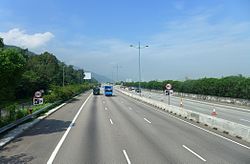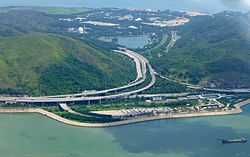North Lantau Highway
| Part of Route 8 | |
North Lantau Highway coloured red | |
| Route information | |
| Maintained by Highways Department | |
| Length | 12.8 km (8.0 mi) |
| Existed | 1997–present |
| Major junctions | |
| West end | Chek Lap Kok |
| East end | Lantau (near Yam O) |
| Location | |
| Country | China |
| Special administrative region | Hong Kong |
| Highway system | |
| North Lantau Highway | |||||||||||||||||
|---|---|---|---|---|---|---|---|---|---|---|---|---|---|---|---|---|---|
| Traditional Chinese | 北大嶼山公路 | ||||||||||||||||
| Simplified Chinese | 北大屿山公路 | ||||||||||||||||
| |||||||||||||||||
North Lantau Highway is an expressway forming part of Hong Kong's Route 8, linking Hong Kong International Airport and Lantau Island with the rest of the territory. The road has three lanes in each direction for its entire length with full-width hard shoulders for emergencies and breakdowns. The speed limit is 110 kilometers per hour (68 mph) for most of its length, the highest of any road in Hong Kong.
North Lantau Highway is 12.5 kilometers (7.8 mi) in length, beginning at Airport Road on Chek Lap Kok. The road then crosses onto Lantau Island and bypasses Tung Chung New Town. The road then travels along the northern coast of Lantau Island, next to the Airport Express and Tung Chung line of the Mass Transit Railway (MTR). This section is built on reclaimed land and through various cuttings. Finally, the road climbs over Ta Shui Wan and Tsing Chau Wan to meet the Lantau Link and its bridges.
History
Background
The North Lantau Highway was built as part of the Airport Core Programme in the 1990s. The ultimate aim of the new motorway was to connect Hong Kong's urban core with the new international airport (opened 1998) as well as associated new town development in Tung Chung. Construction commenced in June 1992 to a design by Mott MacDonald Hong Kong.[1][2]
Construction and opening
Rather than tendering the project as a single contract, which would have drawn bids from only the largest international contractors, the Hong Kong government opted to split the expressway into three separate phases that would be more manageable in scale to local companies, thereby drawing a more competitive range of bids.[3] The contract to construct the Tai Ho Section, worth HK$3.5 billion, was awarded on 8 June 1992 to the Lantau Expressway Joint Venture, of which Downer Group was the lead contractor.[4][5] The Yam O Section contract, worth $1.328 billion, was awarded on 14 September 1992 to a joint venture comprising Aoki Corporation, Franki Contractors, and Tobishima Corporation. Lastly, the Tung Chung Section contract, worth $969.1 million, was awarded on 27 September 1993 to a joint venture composed of China State, Leighton Asia and Hochtief.[4]
The expressway opened to traffic on 22 May 1997.[1] In the days leading up to the opening, officers of the Agriculture and Fisheries Department rounded up about 30 cattle who had wandered onto the highway during construction, when the perimeter fence was not fully enclosed.[6]
Sunny Bay Interchange
The Sunny Bay Interchange came into operation in 2005, allowing traffic to exit the North Lantau Highway onto the new Penny's Bay Highway. This opened up access to Penny's Bay, which was reclaimed mainly for the new Hong Kong Disneyland.
2008 flooding
On 7 June 2008, North Lantau Highway and its service road, Cheung Tung Road, were completely flooded at Caribbean Coast, Tung Chung at 6am, under rainfall as high as 145 mm (5.7 in) per hour. The highway was forced to close completely, rendering Hong Kong International Airport at Chek Lap Kok inaccessible by road. With a water depth of 3 meters (9.8 ft), and the flood extending 500 meters (550 yd) in length, some 20 vehicles were trapped on the scene by the floodwater. Another thousand vehicles were trapped in the resulting traffic jam, extending about 10 km (6.2 mi) back to the toll plaza of Lantau Link. Service was increased on the MTR Tung Chung line and Airport Express to alleviate passenger flow.
The highway was partially reopened starting from 4:00 pm that day.[7][8]
Design
An early design for the North Lantau Highway was completed in the early 1980s. It was envisaged as a two-lane dual carriageway "[hugging] the rugged northern coastline of Lantau". However, the plan did not proceed at that time as the airport project was shelved by the government for financial reasons.[2]
The Chek Lap Kok airport project was resurrected in 1989 under the governorship of David Wilson. In the same year, new motorways design standards were introduced in Hong Kong. In 1990, the highway was redesigned to reflect these new standards, and to take into account higher projected usage. The North Lantau Highway, as built, is a three-lane dual carriageway with a gentler grade and curvature than the earlier iteration. Hard shoulders of 3.3 metres are also provided on either side of the expressway.[2]
Most of the highway is built on reclaimed land.[9] The fill for the land reclamation came from slope cuttings or marine borrow areas in Hong Kong, or was river sand imported from China.[2]
The most significant bridge along the length of the road is located at the very end of the highway, linking Lantau and Chek Lap Kok. This multi-span structure, approximately 320 metres long, also carries a utility conduit serving the airport containing electricity, water, sewerage, telephone, and raw water connections. There are smaller bridges at Tai Ho Wan and Sham Shui Kok.[2]
Interchanges
This article contains a bulleted list or table of intersections which should be presented in a properly formatted junction table. |
| District | Location | km | Interchange name | Exit | Destinations | Notes |
|---|---|---|---|---|---|---|
| Islands | Chek Lap Kok | 0.0 | Airport Road – Airport |
Western terminus; start of Route 8 distance markers. | ||
| Tung Chung | 0.4 | Start of expressway; western terminus of Route 8. | ||||
| 0.6 | 6C | Tung Chung Waterfront Road – Tung Chung (North) | Westbound exit and eastbound entrance Formerly numbered 6B | |||
| 1.6 | Tung Chung Eastern Interchange | 6B | Yu Tung Road – Tung Chung Town Centre, Tung Chung (West) | Westbound exit and eastbound entrance Formerly numbered 6A | ||
| Siu Ho Wan | 3.4 | 6A | Shun Long Road – Tuen Mun, Zhuhai, Macao | Eastbound exit and westbound entrance Linkage to the Hong Kong–Zhuhai–Macau Bridge and Tuen Mun-Chek Lap Kok Link | ||
| 4.8 | Siu Ho Wan Interchange | 6 | Unnamed access road – Siu Ho Wan MTR Depot | |||
| 5.4 | 5A | Shun Long Road – Zhuhai, Macao | Westbound exit and eastbound entrance Linkage to the Hong Kong–Zhuhai–Macau Bridge | |||
| Tsuen Wan | Yam O | 11.3 | Sunny Bay Interchange | 5 | ||
| Tsing Chau Tsai | 12.9 | Lantau Toll Plaza | Eastern terminus (at toll booths); | |||
| 1.000 mi = 1.609 km; 1.000 km = 0.621 mi | ||||||
Traffic
The Transport Department offers traffic figures at two sections of the North Lantau Highway. The section between the western end of the highway (i.e. Airport Road) and the Tung Chung Eastern Interchange registered annual average daily traffic (AADT) of 54,410 in 2016. The section between Tung Chung and Ngong Shuen Au was busier, carrying 66,110 AADT in 2016.[10]
Traffic on the highway has increased in recent years. Some residents and legislators have raised concerns that the new Hong Kong–Zhuhai–Macau Bridge (see below) will increase traffic congestion.[11]
Current developments
A new interchange at Tai Ho Wan is under construction. This will connect the North Lantau Expressway to the Border Crossing Facilities Island (BCF Island), a new artificial island being built as part of the controversial Hong Kong–Zhuhai–Macau Bridge project. The connection between the new island and the North Lantau Expressway is actually being built under the Tuen Mun–Chek Lap Kok Link project, a new road tunnel connecting Tuen Mun to the BCF Island.
From the new interchange, a two-lane dual carriageway will run on viaducts, over the sea, to the BCF Island. The project (including the viaducts, the interchange, and modifications to the North Lantau Highway and Cheung Tung Road) is being built by Hong Kong contractor Gammon Construction for a contract value of HK$8.66 billion. The Highways Departments expects this to be complete by 2019.[12]
References
- ^ a b "North Lantau Expressway". Hong Kong Airport Core Programme. New Airport Projects Co-ordination Office, Government Secretariat. Retrieved 19 February 2018.
- ^ a b c d e Lloyd, R.H. (1998). "Design and construction of the West Kowloon Expressway, Kwai Chung and Tsing yi section of Route 3 and the North Lantau Expressway". Proceedings of the Institution of Civil Engineers. 126 (6): 16–34. ISSN 1751-7672.
- ^ Yue, S.Y. (7 March 1992). "Expressway contract split to help locals". South China Morning Post. p. 5.
- ^ a b "List of Current Contracts as at 31/12/96". Hong Kong Airport Core Programme. New Airport Projects Co-ordination Office, Government Secretariat. Retrieved 19 February 2018.
- ^ "Tai Ho route almost finished". South China Morning Post. 28 October 1993.
- ^ Delfino, Brendan (22 May 1997). "Drivers' beef with new road". South China Morning Post. p. 4.
- ^ "百年一遇 暴雨沖潰機場命脈 北大嶼山公路成河道 交通癱瘓10小時". Ming Pao. 2008-06-08.
- ^ "洪水五秒癱瘓機場公路". Sing Tao Daily. 2008-06-08.
- ^ "Work on highway split into three". South China Morning Post. 14 October 1991.
- ^ "The Annual Traffic Census 2016" (PDF). Transport Department. August 2017.
- ^ Clark, Robert (18 January 2018). "N. Lantau Highway traffic up 40% over four years". Lantau News.
- ^ "Contract No. HY/2012/07 Tuen Mun–Chek Lap Kok Link Southern Connection Viaduct Section". Highways Department. Retrieved 19 February 2018.
External links
Media related to North Lantau Highway at Wikimedia Commons
| Preceded by Lantau Link |
Hong Kong Route 8 North Lantau Highway |
Succeeded by Western Terminus |


